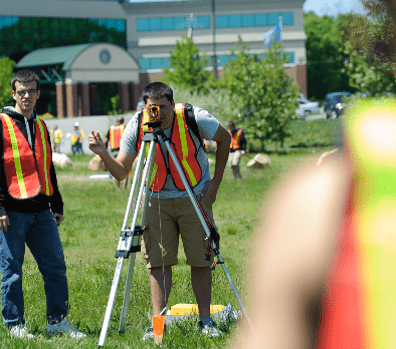Program Overview

Our Civil Engineering Technology associate degree program prepares you to become an integral part of an engineering and construction team. Learn how to apply the fundamentals of civil engineering and design within the context of materials, soils, planning, surveying, environmental systems, highways and construction. Eligible for entry-level positions with civil engineering firms, land surveying companies, utility companies, construction firms, and more.
Read More
Full Description
The Civil Engineering program prepares graduates to become an integral member of the engineering and construction team. The program emphasizes the practical application of construction technology and engineering principles.
A civil engineering technologist designs, engineers, analyzes, and assists in the supervision of building construction and infrastructure projects such as roadways, bridges, and environmental facilities. As an integral member of the engineering and construction team, the civil engineering technologist must have the ability to create and build structures that will answer the engineering, economic, safety, technical, and aesthetic requirements of a project. This program allows students to develop those necessary abilities by emphasizing the application of the fundamentals of civil engineering and design within the context of the scientific and technical aspects of materials, soils, planning, surveying, structures, environmental systems, and construction. The program is also designed to instill within students a sense of professionalism and a desire to serve and contribute to society.
In the associate degree program, students concentrate on civil engineering fundamentals including computer-aided drafting geared for the civil engineering industry (e.g., Auto CAD Civil 3D), construction documents, construction estimating, construction materials, structural analysis and design, surveying principles for land measurement, and soil mechanics. Additionally, students will also conduct field and laboratory testing on civil engineering materials and use computer applications to solve technical problems.
Upon successful completion of the Civil Engineering Associate Degree, students may choose to continue their education in a bachelor’s program or enter the profession. Graduates of the CET associate degree program will be qualified for entry-level careers with civil engineering firms, survey companies, materials testing companies, or construction companies.
Students successfully completing the Associate in Science in Civil Engineering may matriculate into the Bachelor of Science Degree in Construction Management or the Bachelor of Science Degree in Civil Engineering program.
Potential Career Opportunities
The associate in science degree can lead to a variety of exciting employment opportunities.
More advanced positions may require additional education, though an associate degree in the subject can prepare individuals as assistants to civil engineers and other individuals leading engineering and surveying projects.
Civil Engineering Technician
Drafter Land Surveyor
Cartographer
Operator
Soil Technician
Site Supervisor
FAQ
-
How much does a civil engineer with an associate degree make?
Current statistics on potential salaries and job outlook are listed on the Bureau of Labor Statistics (BLS) website.
-
What can I do with an associate degree in Civil Engineering Technology?
Individuals with an associate degree in Civil Engineering Technology can find work as an engineering surveyor, inspector or design technician.
Individuals may also qualify for work as an engineering technician. These individuals will typically work within a specialty area. Options include aerospace engineering technology, environmental engineering and water systems, or geotechnical engineering and rock mechanics.
-
Is Civil Engineering Technology hard?
If you have strong problem-solving and communication skills and enjoy math, physics and engineering, then the subject shouldn’t be too difficult. That said, college course loads can be demanding, so it’s important to remain committed to your studies.
-
Are engineering technology degrees worth it?
A degree in civil engineering technology helps distinguish an individual from other applicants during the job search and can lead to positions in different areas of the field working as a project manager, on designs, monitoring construction sites or solving problems occurring onsite.



